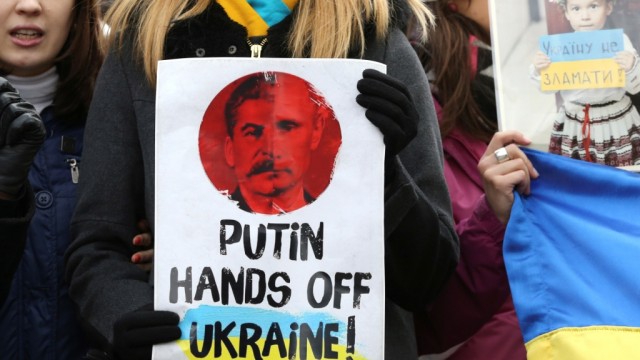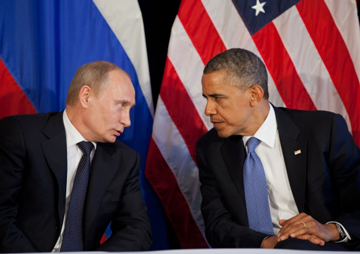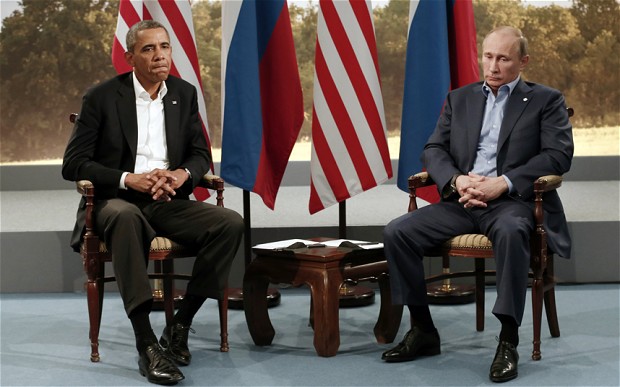You have to laugh, if only to keep from crying, to hear the White House and State Department repeatedly pronounce how the sanctions are biting and “isolating” Russia over its Ukrainian mischief. Even if that’s true, it will only make matters worse, because nationalism, especially Russian nationalism, feeds off bad economies and isolation.
 This crisis is neither a Ukrainian nor a Putin problem. At the political level, it’s a crisis of the collapse of the old order, with direct implications, for the first time in history, for the entire world. As such, it is neither a matter of regional hegemony or national diversity, so-called liberal pluralism. Atavistic and much more destructive patterns of power and empire are in play, and so far they are carrying the day.
This crisis is neither a Ukrainian nor a Putin problem. At the political level, it’s a crisis of the collapse of the old order, with direct implications, for the first time in history, for the entire world. As such, it is neither a matter of regional hegemony or national diversity, so-called liberal pluralism. Atavistic and much more destructive patterns of power and empire are in play, and so far they are carrying the day.
So even if America and Europe unite behind serious economic sanctions that hurt Russia’s financial, energy and military sectors, it will only exacerbate the problem and play into Putin’s hands, because severe sanctions will inflame jingoism in Russia. That will ramp up a new Cold War, which will come back and bite us in the ass.
That isn’t to say America and Europe should do nothing in terms of sanctions, or that we have to accept the false choice of sanctions or war. The challenge is much deeper, and the West is not meeting it at present. A dangerous vacuum of leadership has opened up since America fell into decline (exacerbated, but not caused by Bush-Cheney). It cannot be met with the usual measures, especially since the international system is fraying fast.
President Obama’s “playing the long game” has begun to sound an awful lot like Bush’s “ultimately history will judge what I did.” When the old order is in ruins at your feet, it’s absurd to talk about “steadily advancing the interests of the American people in partnership with folks around the world.”
It isn’t President Obama’s fault, even though he won the presidency under false pretences—as “the man who offered himself up as the moral beacon of the world.” More importantly, Obama got elected on false premises, foremost of which is that America was still an intact nation and people, when it hasn’t been for a generation.
It’s doubly ironic that both liberal and conservative voices, desperately trying to shore up the crumbling status quo, use the language and superficial philosophy of ‘diversity.’ Diversity in the natural world is disappearing before our eyes at the hands of man; do these folks really believe that human diversity, which has been gutted by globalization, can be preserved while decimating the planet?
The prevailing belief that what comes after the post-World War II international order, not to mention the  300-year-old nation-state system, will inevitably be conflict and disorder is defeatist, indeed, self-fulfilling.
300-year-old nation-state system, will inevitably be conflict and disorder is defeatist, indeed, self-fulfilling.
The choice between preserving the nation-state system and resigning to a world of conflict and disorder (if not anarchy and chaos) is a classic false choice. Neither is an option.
Ukraine, like Syria and all countries in one form or another, is coming apart. The solution, as counter-intuitive and allegedly ‘utopian’ as it seems, is to embody, in some kind of new, non-power-holding global body, the principle of the sovereignty of humanity. Until that happens, the sovereignty (which literally means supreme thing) of nearly 200 nation-states will continue to fragment, producing more and more conflict and disorder.
Western Ukrainians may not be willing to kill or be killed to keep Ukraine whole, as they’ve known it since the collapse of the Soviet Union and the Orange Revolution. But Eastern Ukrainian ‘separatists’ certainly are willing to kill or be killed to form their own ‘autonomous region’ and unite with Mother Russia.
The principle of the sovereignty of humanity, given tangible form in a body that philosophically supersedes while pragmatically complements and reforms the United Nations and the international system, will allow ‘autonomous nations’ to emerge with a great reduction in conflict and violence. When wholeness is redefined in a philosophically tangible and politically practical way as the wholeness of humanity, then the primary reason to kill or be killed is taken away from nationalists.
Of course, few nations at present are willing to allow the sovereignty of humanity to supersede the sovereignty of their nation, which is why few nations (only Costa Rica that I know of) are willing to disarm. Will it take a catastrophe like nuclear war for nations acknowledge the primacy of humanity as a whole?
Even if the use of nuclear weapons is inevitable, the philosophical and political foundation has to be poured when the catastrophic collapse of the international order occurs, or there will be the disorder and chaos for the foreseeable future that the experts are so sanguinely and complacently predicting.
To resign to the present drift and deterioration in global affairs is neither acceptable nor necessary. The moment of greatest decay and darkness is also the moment of greatest opportunity for radical change. A true alternative can emerge at all levels simultaneously—spiritual, psychological, philosophical and political.
At bottom, in our interconnected world, the collapse of the international order is a crisis of consciousness for humankind as a whole. Can we draw forth into the political sphere the religious impulse within all people, without giving primacy to religious traditions and institutions, which non-coincidentally are also crumbling and becoming irrelevant?
There is tremendous urgency. Religion has to be kept out of politics, but the spiritual dimension has to infuse it.
Martin LeFevre

